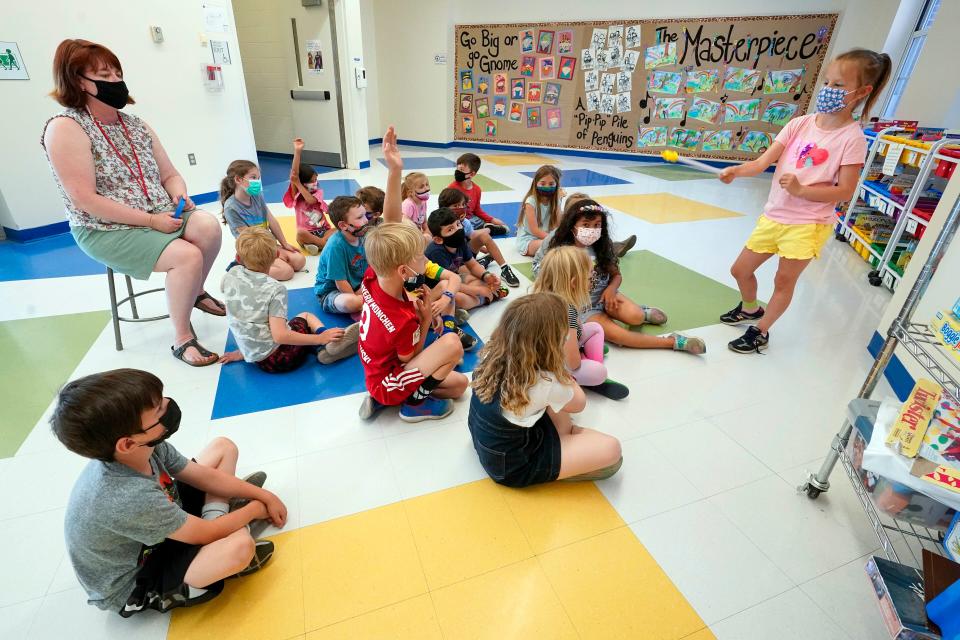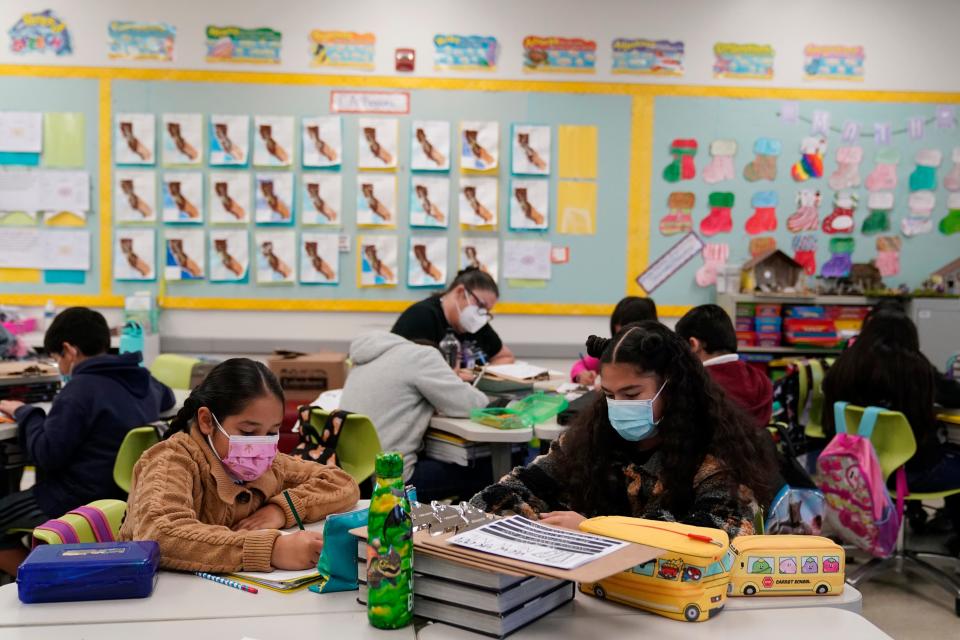With vaccines available mask mandates are not necessary in school
- Oops!Something went wrong.Please try again later.
As scientists and physicians, we are concerned that COVID-19 mitigation measures for children are doing more harm than good. Too many policymakers have viewed health as the mere absence of COVID-19, putting children into a loop of mitigation measures that are uncoupled from actual risk.
After two years of living with one disruption after another, the evidence is clear: The pandemic and the loss of normalcy are taking a tremendous toll on students, with the data on mental health being particularly alarming.
The American Academy of Pediatrics has declared a mental health emergency in children. As the surgeon general recently highlighted, combined analyses of 80,000 children found that symptoms of depression and anxiety have doubled among young people during the pandemic, with 1 in 4 showing depressive symptoms and 1 in 5 showing anxiety.
By early 2021, nationwide emergency room visits for suspected suicide attempts in adolescent girls had increased by 51% compared with pre-pandemic levels. Researchers at the University of Michigan reported a 120% increase in adolescent hospital admissions for eating disorders. School closures are associated with considerable harm to children’s health including learning loss, emotional, behavioral and attention problems, marked rises in screen time and social media use, reduction in physical activity and increase in childhood obesity.
Serious COVID cases are rare
In contrast, the risk children face from the pandemic is not extraordinary. COVID-19 can be serious in children in rare cases, and vaccines are available to prevent serious disease. Even in unvaccinated children, though, rates of serious disease from COVID-19 are similar to that of the seasonal flu, and we do not normally take exceptional precautions in schools for the flu for which we do not normally implement school mask mandates, quarantines or other disruptive policies.
Former U.S. Surgeon General: I got it wrong on masks at the start of the pandemic. This is how we can get it right.

We needn’t let fear of “long COVID” in children drive school policy decision-making. Studies of post-COVID symptoms consistently find similar outcomes in children who had COVID compared with other common childhood infections.
Vaccination is our most effective tool against COVID-19, and vaccines are retaining efficacy where it counts. With omicron, we can expect numerous mild infections in vaccinated people, but the vast majority of hospitalizations and deaths are among unvaccinated adults. Teachers, parents and caregivers remain well-protected by vaccination, and one booster dose provides additional protection for those who are over age 65 or at additional risk.
Omicron isn't over: What COVID-19 cases look like across the US
One-way masking with N95-type respirators protects the wearer, and N95s are now widely available for people who desire a higher level of protection against COVID-19.
Mild infections are inevitable
It’s time to help children, parents and school staff view mild coronavirus infections as inevitable and not apocalyptic and focus on preventing severe cases. With omicron now starting to decline in many parts of the country, preserving in-person learning, de-escalating fear and making a concerted effort to resume normalcy are critical.
While we continue to emphasize vaccination as the best way to protect against COVID-19, we suggest ending ineffective practices such as the use of plexiglass barriers – and asymptomatic testing as advised by the Children’s Hospital of Philadelphia’s Policy Lab. It is essential to encourage socialization at lunchtime and recess. Students should engage in extracurricular activities and social events without being treated differently based on vaccination status. Importantly, bolstering mental health services in schools is critical in order to help students and staff cope and recover.
My triple-vaxxed, 85-year-old mother got COVID: Medical triage made her doctor useless.

It’s time to shift our focus away from masks and onto the faces behind them. Mandatory masking policies are the most visible COVID mitigation interventions in schools. We have reviewed the data on school masking and find that well-controlled real-world studies consistently fail to find a convincing benefit, while studies cited to support masking have serious flaws. When an intervention’s possible benefits are too small to measure and the harms are increasingly evident, it is appropriate to end its mandatory use.
Above all, we entreat policymakers to fully restore normal life and school for all children at the first opportunity. The school years are critical for cognitive, emotional and social development. It is time to recognize the myriad threats to children’s safety – beyond that of a single virus – and to appropriately balance these risks.
COVID-19 is here to stay, and although we can mitigate risk, we cannot eliminate it. Though we have effective vaccines against COVID’s worst outcomes, no one is immune to two years of life interrupted. An urgent return to normal school, without mandatory masking, is critical for our kids’ health and wellbeing.
Views presented here represent the authors' combined perspective and are not necessarily representative of their employers, institutions or professional associations.
Dr. Scott Balsitis has 22 years of experience in viral immunology, including on vaccines and therapeutics against HIV, Hepatitis B, RSV, Influenza, and COVID-19.
Dr. Lucy McBride is a Harvard- and Johns Hopkins-educated and board-certified internal medicine physician in Washington D.C. She is a mental health advocate and author of a popular COVID-19 newsletter.
Dr. Kristen Walsh is a board-certified pediatrician with over 20 years of clinical experience in both academic and community practice settings. For the past 10 years, she has been involved in early childhood advocacy on both the state and national levels.
Dr. Carol Vidal is an assistant professor and psychiatrist who specializes in child and adolescent psychiatry and works in schools in Baltimore, Maryland.
The following individuals contributed to this piece:
Dr. Martha Fulford is a pediatric infectious diseases specialist in Hamilton, Ontario.
Dr. Jeanne Noble is Director of COVID Response for the UCSF Parnassus Emergency Department.
Dr. Jennifer Grant is an infectious disease physician in British Columbia.
Dr. Kwadwo Kyeremanteng is an Associate Professor of Critical Care in Ottawa.
Dr. Vinay Prasad is an Associate Professor in Epidemiology and Biostatistics in San Francisco.
Dr. Kory Stotesbery is a pediatric psychiatrist in San Francisco.
Dr. Ram Duriseti practices pediatric emergency medicine at Stanford.
Dr. Todd Porter is a community pediatrician in Illinois.
Dr. Nicole Johnson is an Assistant Professor of Pediatrics in Cleveland.
Dr. Eliza Holland is a pediatric hospitalist practicing in Charlottesville, Virginia.
You can read diverse opinions from our Board of Contributors and other writers on the Opinion front page, on Twitter @usatodayopinion and in our daily Opinion newsletter. To respond to a column, submit a comment to letters@usatoday.com.
This article originally appeared on USA TODAY: End mask mandates for children in schools to restore normalcy

